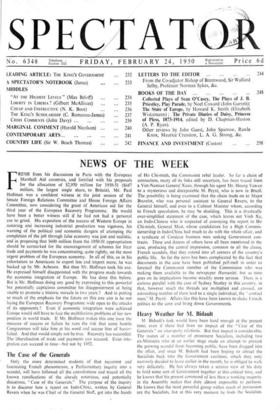NEWS OF THE WEEK
ERESH from his discussions in Paris with the European Marshall Aid countries, and fortified with his proposals for the allocation of $2,950 million for 1950-51 ($687 million, the largest single share, to Britain), Mr. Paul Hoffman was a confident witness at the joint session of the Senate Foreign Relations Committee and House Foreign Affairs Committee, now considering the grant of American aid for the third year of the European Recovery Programme. He would have been a better witness still if he had not had a personal axe to grind. His exposition of the success of Western Europe in restoring and increasing industrial production was vigorous, his warning of the political and economic dangers of cramping the completion of the job through false economy was just and realistic, and in proposing that $600 million from the 1950-51 appropriation should be earmarked for the encouragement of schemes for freer trade and payments he was concentrating, quite rightly, on the most urgent problem of the European economy. In all of this, as in his exhortation to Americans to export less and import more, he was backed up by Mr. Acheson. But then Mr. Hoffman took his axe. He expressed himself disappointed with the progress made towards the economic integration of Europe. He has done this before. But is Mr. Hoffman doing any good by expressing to this powerful but potentially capricious committee his disappointment at being unable to promote a historic miracle in two years ? And in putting so much of the emphasis for the future on this one aim is he not laying the European Recovery Programme wide open to the attacks of its opponents ? Even if economic integration were achieved Europe would still have to face the multifarious problems of her new position in world trade. If Mr. Hoffman makes this one issue the measure of success or failure he runs the risk that some hostile Congressmen will take him at his word and accuse him of havinr failed. And that would simply not be true. Recovery has succeeded. The liberalisation of trade and payments can succeed. Even inte- gration can succeed in time—but not by 1952.


































